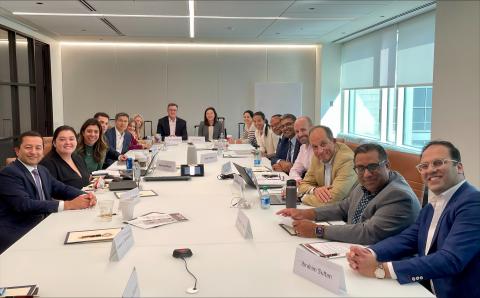An unrelenting focus on the audience is the best approach to making a conference special. STS subspecialty program chairs share their perspectives on what makes STS 2024 a high-value experience. Emphasis is on discovery, personalization, inclusivity, and connection. And don't forget the swag!

Joshua B. Goldberg, MD, Adult Cardiac Program Chair
“What's new and exciting in the track? Well, there is a whole spectrum of adult cardiac surgery education and training opportunities, including coronary aorta, valve, and A-fib. There are cutting-edge topics, new treatment modalities, and new management strategies that are going to excite and interest our members. Experts from around the world – the US, Europe, Asia, and beyond – will share advances in surgical management, perioperative management, and more. Presentations will cover advances in technologies and how to integrate them into our daily practice.
Rakesh C. Arora, MD, PhD, FRCSC, Perioperative/Critical Care Chair
“This year, an overabundance of really fantastic workshops were submitted to the Annual Meeting. We strove to involve the entire interdisciplinary team as part of our program, starting with the preoperative phase on enhancing recovery after surgery and patient blood management to ECMO and improving quality outcomes after cardiothoracic surgery. We sought to welcome all members of the interdisciplinary team to the meeting.
We’ve seen a lot of changes in cardiothoracic surgery, not only in terms of the urgency and the complexity of cases, but also in how our teams change dynamically in the perioperative space, both in the ICU and the ward, as we rise to meet the challenges and the needs of our patients.
Our patients are getting older, sicker, and more complex. They have less reserve for complications and require a comprehensive plan for their management. It's incumbent upon our Society through our educational endeavors to ensure we meet the needs of our membership to face these challenges in the years to come.”
Thomas Varghese, Jr., MD, MS, MBA, Chair, STS Council on Education
“The STS Annual Meeting serves as a forum where best practices can be highlighted and as an environment where we can learn from each other. In all four domains of the specialty, the meeting offers the best content from leading experts in the world. We have people who have rich experience in building skill sets, and we welcome all surgeons at every career stage.
The meeting is an opportunity not only to connect with our peers but to teach the next generation and learn from them.”
Ibrahim Sultan, MD, Wellness/Education/Quality Chair
“We’re going through one of the most exciting times in cardiothoracic surgery and are experiencing incredible change. The abstracts and session proposals submitted by our members for the Annual Meeting are a reflection of these changes. We’re thrilled to showcase that.
We are going to take a deep dive into healthcare disparities and equity issues in cardiothoracic surgery. And, we’re going to talk about surgeon wellness. We have an ergonomics session that teaches us how to change our loops and our headlights, how to position our keyboards, and how to stretch before and after surgery.
We’re also going to focus on career tracks and content tracks for trainees. Getting our trainees – the surgeons of the future – front and center and allowing them to network with and learn from senior surgeons is critical.”
Allan Pickens, MD, General Thoracic Chair
“For the thoracic track of the meeting, our members will be interested in articles that pertain to neoadjuvant, adjuvant treatments, in addition to immunotherapy. Those therapies will potentially open a new population of patients that may be eligible for resection. They’ll also be interested in hearing about the impact of artificial intelligence on thoracic surgery. The ability to screen patients and identify patients with more advanced diseases will be tremendously aided by the artificial intelligence that's coming our way.
Bringing teams together for the Annual Meeting emphasizes the impact of a team approach to thoracic care. It allows everyone to learn the process and participate in innovative techniques and take them back to their home institutions.”